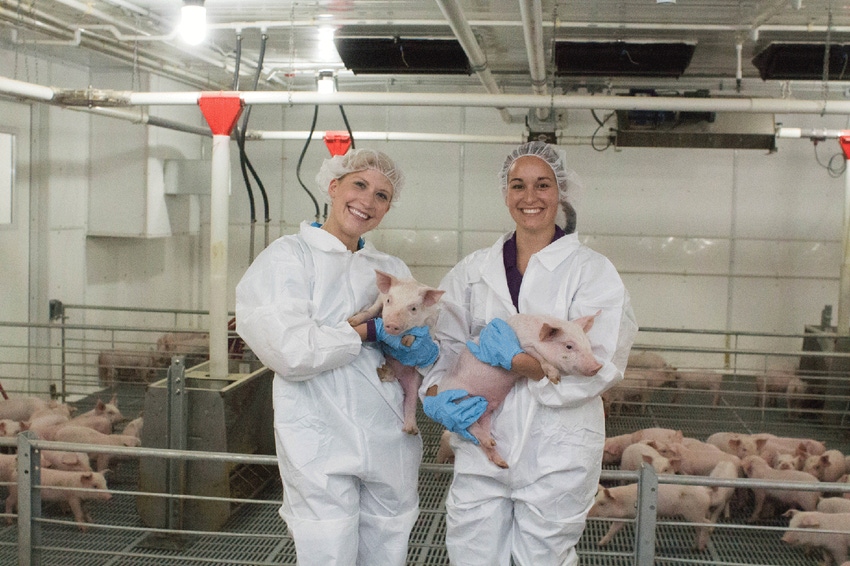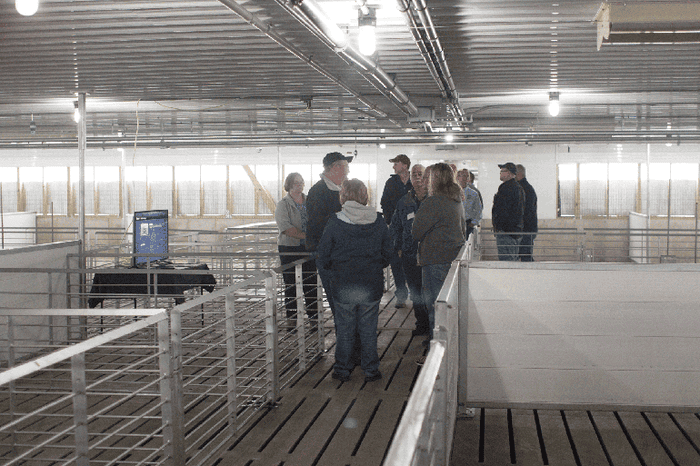Cooper Farms video series shows instead of tells.

Most neighbors today don’t put out the welcome mat and bring over a plate of cookies when a new sow farm goes up in their community. More often, complaints and concerns are spread around the township or county before the cement is even poured.
Cooper Farms recognizes that.
“We’re growing. We’re always getting new neighbors, and we want to be clear to those people, and with those who already know us, about what it is we do,†says Terry Wehrkamp, director of live production for Cooper Farms.
The family-owned and -operated turkey, chicken and hog producer based out of northwest and west-central Ohio is expanding, putting up a new sow barn this spring and adding more growers to its current 110-hog contract family farm system. Ever since the Cooper family decided to enter the hog business in 1994, the family has made it a point to reach across the fence at all of their farms, which together produce 200 million pounds of live hogs per year.
“We have a reputation of being good neighbors,†says Wehrkamp. “It’s not just something we say, it’s something we do. We want to be transparent with our neighbors and show them that we want to do things the right way.â€
As the Clemens Food Group partner expands north, it realizes reputation hasn’t been established yet in those communities, and it will be some time before Cooper Farms is ready to host its traditional open houses and invite the public in. To address some of those questions and concerns head-on, the pork producer decided not to waste any time, and to take the community behind the scenes now with some of its well-respected growers.
Lights, camera, action
The first of a five-part video series, “Becoming a Cooper Farms Growerâ€, was released through social media platforms and YouTube on Dec. 5, and it has already garnered thousands of views. One new video will be released each month until April, just prior to the completion of the new sow farm.
The video series covers the procedures the company follows to have the least possible impact on the environment and the neighboring communities. Cassie Jo Arend, corporate communication manager for Cooper Farms, says this is an important aspect of the films, as water quality has become an increasing concern in this particular area of the state.
“We really want to make sure on the farm we are doing things the right way, but also then as we are doing that, to tell people ‘This is what we are doing to make sure we are doing it the right way,’ †Arend says. “We want to leave things as good or better for the next generation. This is a way to open that conversation and tell our side of the story.â€
Through the videos, Cooper Farms also hopes to show the intricate process for choosing not only its sites for new barns, but the type of quality contract growers its management seeks to run them.
“When we enter into a partnership with a grower, it’s a decades-long partnership,†says Wehrkamp. “Because of that, we put a lot of effort into getting to know each other up front and getting to know the management style of that farmer.â€

Ever since the Coopers decided to enter the hog business in 1994, they’ve made it a point to reach across the fence at all of their farms, which together produce 200 million pounds of live hogs per year.
Transparency: True, trusted method
Arend says while the contract growers that participated in the video series may have been a bit apprehensive getting in front of a camera, they have had their fair share of practice telling their story. Eight years ago, the pig and poultry producer started adding observation rooms at several of its grow-out farms, and even has one now on a sow farm. Arend says the plexiglass windows have been very beneficial, allowing the public to see inside the barn without the grower having to worry about the biosecurity risk the visitors may be carrying.
Another way Cooper Farms has opened up its barns is through virtual farm tours on both its turkey and hog farms. This allows the grower to stay in the barn and give a virtual tour to students sitting in the classroom.
“That’s not really new in the hog industry, but we are trying to do that from a Cooper perspective by keeping it local with our schools that are nearby,†Arend says. “There are a lot of kids in this area that don’t know much about farming and animal agriculture. They have a better understanding of grain farming in a lot of these areas than they do about livestock.â€
Since many of Cooper Farms’ contract growers are next door to others involved in the agriculture industry and farming, Arend challenged the participating growers before filming the series to think like a consumer — and not a farmer.
“How does a community member that doesn’t know anything about farming see things? What do they think when they look at your barn and have never been inside one?†Arend says. “Put yourself in that mindset and if you can do that, you can tell your story in a way that speaks to those people. If you say it like you are talking to your buddy, who already understands, it’s not going to be the same type of conversation.â€
Nothing to hide
While the video series is just the start to building community relations, Arend says she hopes it opens up some dialogue.
“We do want to hear if they have concerns, but also to know who we are, how we operate, and to trust that we are trying to do everything the best way we possibly can at all times,†Arend says.
It’s an approach Cooper Farms took from the start, and it hasn’t failed yet.
“We just want to give back, because we really care about these communities, and it has helped us to be successful. Being proactive in telling our story and having open houses and things like that have never proved to be harmful, so we want to continue to do that and help make people feel good,†Arend says. “A large part of it is your reputation in the community, and have you proven you’re going to do things the right way and shown that you are not hiding anything.â€
About the Author(s)
You May Also Like





